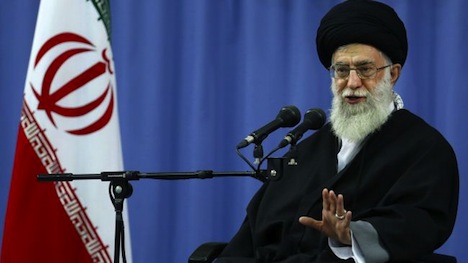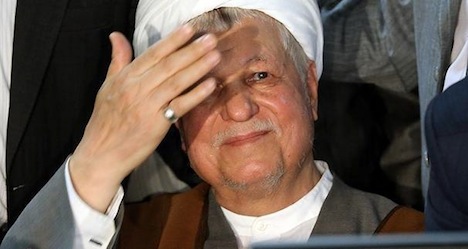Iran’s Guardian Council has spoken — it has announced a list of eight presidential candidates for the June 14 election.![]()
As expected, the list doesn’t include Esfandiar Rahim Mashaei, a key advisor and chief of staff to incumbent president Mahmoud Ahmadinejad.
But the list also doesn’t include Hashemi Rafsanjani, one of the original leaders of post-revolution Iran and himself a former president from 1989 to 2007, chair of the Expediency Discernment Council, and a former presidential candidate in 2005 as well. Rafsanjani’s rejection wasn’t exactly unexpected, but it has the potential to make the 2013 presidential election already as politically explosive as the 2009 presidential election, when Ahmadinejad won a victory that supporters of his opponent, Mir-Hossein Mousavi, a former Iranian prime minister in the 1980s, who ran as a reformist candidate with the support of former reformist president Mohammad Khatami.
The Guardian Council is a 12-member council that vets presidential and parliamentary candidates and otherwise serves as Iran’s final constitutional interpretative body. Its decisions are widely seen as a means of extending the interests of the Supreme Leader, Ali Khamenei (pictured above), given that half of its members are appointed by the Supreme Leader and the other half are appointed by the Iranian parliament, which is dominated by Khamenei’s conservative (or ‘principlist’) supporters.
While Rafsanjani himself wasn’t part of the ‘Green movement’ that challenged the election results, Rafsanjani gently chided Iran’s regime for its harsh and sometimes lethal crackdown, which included jailing many activists and journalists, curtailing freedom of assembly, speech and the press, and resulted in the house arrest of both Mousavi and another reformist presidential candidate, Mehdi Karroubi. Although Rafsanjani lost the chairmanship in 2011 of the Assembly of Experts, he remained the chair of the Expediency Council.*
Rafsanjani, a sometimes-ally and sometimes-rival to Khamenei, dominated Iranian politics in the 1980s alongside Khamenei. Rafsanjani was the speaker of Iran’s parliament when Khamenei was president. When Iran’s first Supreme Leader Ruhollah Khomeini died in 1989, the Assembly of Experts chose Khamenei to succeed him, but Rafsanjani quickly won the first of two terms as president, therefore extending their dual dominance of Iranian politics through the end of the 1990s. Given that Rafsanjani is the most powerful politician in Iran after Khamenei, he would have had the credibility and legitimacy as Iran’s president to challenge the principle authority of the Supreme Leader.
There are essentially three potential outcomes from here:
Rafsanjani accepts the decision, reformists back another candidate.
Rafsanjani could simply accept the Guardian Council’s decision, call on his supporters to back another candidate, and the election will proceed without Rafsanjani. Given his relatively cautious and conciliatory past, this may well be the most likely outcome, especially if Rafsanjani, Khatami, Mousavi and others rally around one of the remaining candidates approved by the Guardian Council, not all of whom are necessarily conservatives. Although five of the eight candidates are ‘principlist’ conservatives who are clearly loyal to the Supreme Leader and unlikely to challenge Khamenei’s imperative, the Guardian Council approved Rafsanjani’s former communication minister, Mohammad Gharazi, as well as the chief nuclear negotiator during the Khatami administration, Hassan Rowhani. The Guardian Council also approved Khatami’s former vice president, Mohammad Reza Aref, who will be the most pro-reform candidate of the eight.
Rafsanjani appeals for Khamenei’s intervention.
Rafsanjani could initially challenge the Guardian Council’s decision and call upon Khamenei to step in to allow his candidacy. That’s not unprecedented — in 2005, Khamenei intervened to request the Guardian Council approve two reformist candidates that it had previously rejected. If Rafsanjani does go to Khamenei, and Khamenei ultimately assents to the request, it would allow Rafsanjani to run while also demonstrating in a very public way Khamenei’s dominance. If the presidential drama plays out this way, it wouldn’t be surprising at all — Rafsanjani remains a candidate, but he’ll owe his candidacy to the goodwill of the Supreme Leader.
Rafsanjani’s supporters boycott the election — or take to the streets.
If Rafsanjani or his supporters don’t accept his rejection, however, it could become very difficult very quickly for Khamenei. If reformers and moderates boycott the election, it would be a significant setback to a regime that hopes to turn the page from the 2009 election, its violent aftermath and the antics of the Ahmadinejad administration. If Rafsanjani’s supporters take to the streets in a way that’s even vaguely reminiscent of the 2009 ‘Green movement,’ it would be difficult for Khamenei to effect another election-related crackdown, especially against Rafsanjani, who was one of the leading figures of the revolution’s first generation. Khamenei lost credibility both in Iran and abroad with the 2009 crackdown, but to take on Rafsanjani would amount to nothing less than a street war between Iran’s two top revolutionary figures at a time when Iran’s economy and its position in the world hang precariously in the balance. Continue reading Rafsanjani, Mashaei both disqualified from running for Iranian presidency

